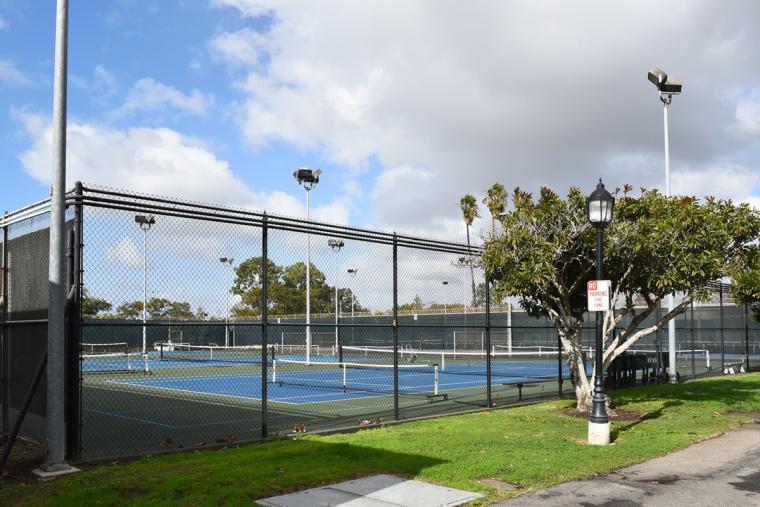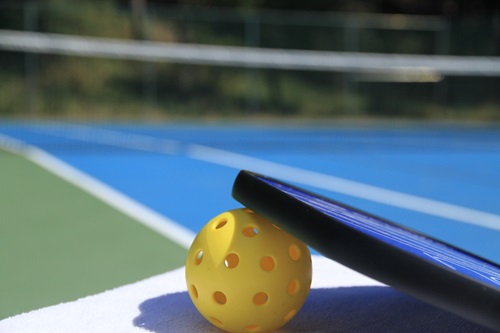
Tennis and pickleball courts on the campus of Golden West College.
Just as pickleball has enhanced recreational programming opportunities in communities around the country, pickleball clubs are bouncing onto college and university campuses at a fast pace.
“With the addition of pickleball, we are not only expanding our sports offerings but enhancing the overall campus experience,” John Beuerlein, president of Drury University, said last fall when campus officials announced the addition of a co-ed pickleball team to its 2024-25 non-NCAA sports offerings. “This exciting addition reaffirms Drury’s dedication to providing diverse opportunities for our students, fostering a vibrant campus life and a robust sense of community.”
Jarrod Smith, Drury’s men’s and women’s tennis coach and winner of multiple national pickleball championships, will transition to head coach of the pickleball program. In doing so, Smith will make the program one of the first in the country to boast a full-time head coach, as well as scholarship opportunities, an on-campus facility and an operating budget. The move comes two years after Drury added six club sports for the 2022-23 academic year: men’s lacrosse, women’s lacrosse, men’s rugby, women’s rugby, men’s hockey and STUNT (which focuses on the technical and athletic components of cheer).
According to USA Pickleball’s website, there are at least 102 college pickleball clubs in the United States — from Texas to Wisconsin and Arizona to Maine — and many of them are on small campuses.
“The cool thing about collegiate pickleball is that it’s not just the big schools that are really starting awesome programs,” Ben Van Hout, who works for the pickleball player rating company DUPR, told KWTX in Waco, Texas. He claims the number of college pickleball programs in the country actually is closer to 130, adding that the number is likely to double or triple within the next year.
Waco-based Baylor University’s pickleball club played its first tournament in October, though it’s not officially recognized yet as a “club,” Baylor’s Paul Underwood told KWTX. “That’s one thing that we’re kind of fighting for. I think we’re going to get that in the fall.”
According to KWTX, in order for Baylor’s team to qualify for club-sport status, the team “must play a competitive schedule for a certain period of time.”
That’s been no problem for the University of Virginia, whose pickleball club — formed in October 2020 with only five players in the midst of the COVID-19 pandemic — won the DUPR Collegiate National Championships last November in Peachtree Corners, Ga., in what was billed as the “biggest collegiate tournament in pickleball history.” Three dozen schools competed “for scholarship money and bragging rights,” according to The Dink pickleball news website. The Cavaliers took home $15,000.
“The club has just been skyrocketing,” club member Alexandra McDonald said in a UVA statement promoting the club. “We’ve had so many people reach out. And the interest has exploded. After everyone saw us win the national championship, we’ve gotten thousands of DMs on Instagram from people wanting to join the team. They’re asking, ‘When are tryouts?’”
As of late last year, the club counted more than 600 members, according to club president and third-year student Conor Burns, who added that the prize money from the national championship was dispersed among the five players competing in the top division and the club’s general funding pool. UVA was slated to compete in tournaments this spring with prize money totaling about $100,000.
 No wonder campuses are beginning to market the sport more aggressively. On April 1 — and it was no April Fool’s Day joke — Clemson University’s athletic department and its licensees launched a new line of pickleball gear that includes paddles, shirts, jerseys, hats, water bottles and other apparel. Clemson’s pickleball club counts more than 1,000 members, according to the Tigers athletic department, which is promoting the club even though the NCAA does not yet sanction pickleball as a varsity sport.
No wonder campuses are beginning to market the sport more aggressively. On April 1 — and it was no April Fool’s Day joke — Clemson University’s athletic department and its licensees launched a new line of pickleball gear that includes paddles, shirts, jerseys, hats, water bottles and other apparel. Clemson’s pickleball club counts more than 1,000 members, according to the Tigers athletic department, which is promoting the club even though the NCAA does not yet sanction pickleball as a varsity sport.
As DUPR’s Van Hout noted, smaller colleges and universities are fielding successful pickleball clubs, too. The club travel team at Utah Tech University in St. George, Utah, for example, was ranked tops in the country at one point last fall, and players have access to what St. George News calls the sport’s “best venue” in town. What’s more, Utah Tech offers pickleball scholarships — still a rarity in collegiate pickleball.
“We’ve been a little bit lucky. It’s been a perfect storm of a bunch of different variables,” club president Hunter Aiono told St. George News. “One, the community here is just awesome. Pickleball is just ingrained in the blood of St. George. Two, the school has been amazing to us. They’ve seen our growth, they’ve supported us from the beginning. And then three, … the students love pickleball. It’s something that they can play year-round here. And it’s so easy to pick up. Every student needs a healthy outlet, something for exercise to take stress off. It’s not hard to get into pickleball once you’re at Utah Tech.”
At least one small college is already planning ahead for its own pickleball program by updating its pickleball courts. With financial assistance and guidance from more than 100 community members, Kellogg Community College in Battle Creek, Mich., renovated and expanded its facility to feature 12 courts — four of them new — for recreational and tournament play.
“Even though we don’t have a pickleball club or a team, as of yet, at KCC we do recognize this sport has grown across the country and even locally, and quite frankly, we find it only a matter of time before some of those things happen,” KCC President Paul Watson II said during a ceremony at the expanded complex last October. “We embrace the opportunity for these courts … to really become a valuable community resource, and we look forward to the fact that it’s open to people of all ages and abilities and available to the public on a daily basis.”

